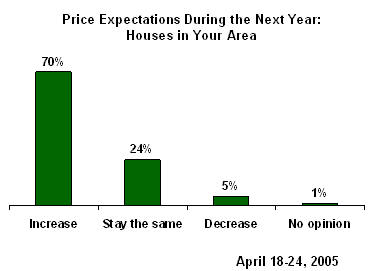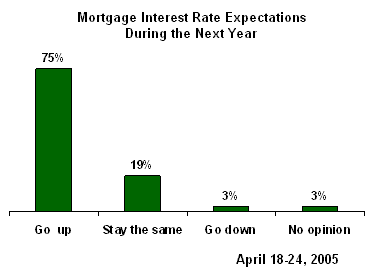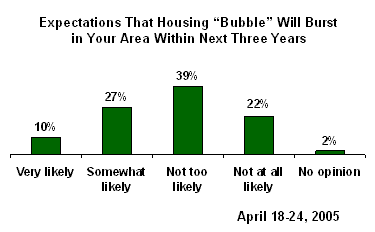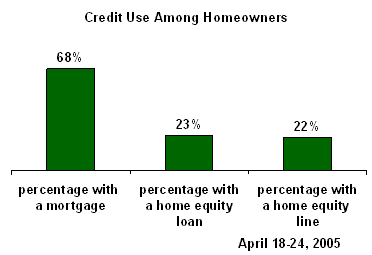GALLUP NEWS SERVICE
PRINCETON, NJ -- Over the past four years, housing prices have increased 50% faster than consumer disposable incomes, according to the Federal Deposit Insurance Corp.'s latest Risk-Based Assessment System report. Add in the National Association of Realtors' observation that nearly one in four homes sold last year were purchased by investors -- people who did not plan to live in the homes, but intended to resell them in the near future at a profit -- and it is little wonder that some economists continue to warn about the potential for the bursting of the "housing bubble."
What does the average consumer think about the idea of a housing bubble? Could the housing bubble burst and have economic fallout similar to that of the dot-com bubble? Is this something today's home buyers should be worried about as they consider their purchases? The latest Experian/Gallup Personal Credit Index survey provides some key insights.
Housing Price Expectations
Not surprisingly, 7 in 10 consumers expect housing prices in their areas to increase over the next year. Significantly, one in three of those who expect rising prices think they will go up by 10% or more during the next 12 months. In fact, nearly 1 in 10 expect housing price increases in the 20%+ range in their areas.

Three in four consumers expect mortgage rates to increase over the next year. Nearly half of those expecting mortgage rates to increase say they think rates will increase by 1.5 percentage points or more over the next 12 months. Another 35% say they expect mortgage rates to rise by 1 percentage point, while only 16% expect them to increase by half a percentage point.

Only about one in three consumers recognize the term housing bubble. However, when respondents hear it described as involving a rapid and steep increase in housing prices, similar to a bubble that could suddenly burst and bring sharply lower prices, almost 4 in 10 say this is somewhat or very likely to take place in their areas within the next three years.

Will There Be a Housing Price Collapse?
Given the housing price trends of the past several years, it is not surprising that so many consumers believe the potential for a housing price collapse in their areas is real -- particularly when they are asked to think about the next three years. It just doesn't seem possible that housing prices can continue to escalate so much faster than worker incomes over the longer term. And, the presence of housing speculators making lots of money from buying and quickly selling properties simply emphasizes the seeming excesses in many of today's housing markets.
Of course, as many housing economists suggest, there are a number of good reasons for the acceleration in housing prices: mortgage rates remain near historic lows, enabling home buyers to carry more debt and bid more for housing; creative financing has reduced down-payment and debt-ratio requirements, allowing home buyers to increase their leverage and bid more; and building restrictions in many areas have artificially reduced the supply of housing, pushing prices higher.
The problem is that housing market conditions can change relatively quickly. Mortgage interest rates could surge, reducing the ability of many potential buyers to pay today's home prices. Highly leveraged housing speculators could be hit with longer holding periods and higher carrying costs. Many could be forced into distress sales. Not only might the rate of housing price increases slow, but housing prices might actually drop.
In contrast to housing speculators, most homeowners live in their homes. If housing prices suddenly drop in a local market, many homeowners who are thinking of selling can simply change their minds and take their homes off the market. The housing market would slow, but only homeowners and investors in "distress" would be forced to realize their losses.
The Home Equity Borrowing Complication
The FDIC reports that home equity loans have grown at double-digit rates over the past four years and are "the fastest-growing asset class for commercial banks." The Experian/Gallup survey shows that 68% of homeowners have mortgages on their homes, with about one-third that number, 23%, having home equity loans, and 22% having home equity lines or accounts.
About one in five home equity loans and about half of the home equity lines have variable interest rates. This means many of these homeowners are already experiencing financing cost increases, because the Fed has raised short-term interest rates 2 percentage points over the past year. Add the potential for a drop in housing prices and home equity in some overheated housing markets, and some homeowners could easily end up being upside down financially -- owing more on their houses than the houses are worth in the marketplace. Although housing leverage works for homeowners as prices go up, the reverse happens as prices decline, and relatively small percentage drops in value can mean sizable losses for consumers.

Economic Fallout
Even as the economy has slowed and wages have stagnated, consumers have been spending. This has been possible in part through borrowing on their home equity. Rapidly increasing home prices and relaxed lending requirements have both enabled and encouraged this process.
If home prices actually begin to decline in some markets, the economic fallout could be much greater than just a drop in construction activity. By reducing consumer access to home equity loans and lines, a decline in housing prices is also likely to significantly influence consumer spending.
Will Home Buyers Stop Buying?
Housing prices can't continue to soar in a low-inflation, stagnant-wage economy over the longer term. The odds are that at some point, the housing bubble will burst in many markets, if not nationwide; precisely when that happens may well depend on long-term interest rates and the international money markets.
In the meantime, there is no reason to believe that many of today's home buyers are particularly concerned about the potential for a bursting of the housing bubble. Most home buyers purchase a home as a place to live for many years. Because they are not worried about immediate resale, short-term fluctuations in housing prices are not a major concern. Over time, housing has proved to be a great long-term investment and has provided homeowners with substantial long-term appreciation. Given this context, it is not surprising that 8% of Americans say they plan to borrow the money to buy a new home in the next six months.
On the other hand, today's housing speculators may want to look into the experiences of the speculators who participated in the dot-com bubble. It might just be that the nearly 4 in 10 Americans concerned about a housing price collapse could turn out to be correct.
Survey Methods
Results for the Experian/Gallup Personal Credit Index poll are based on telephone interviews with 1,001 adults, aged 18 and older, conducted April 18-24, 2005. For results based on the total sample, one can say with 95% confidence that the maximum margin of sampling error is ±3 percentage points. In addition to sampling error, question wording and practical difficulties in conducting surveys can introduce error or bias into the findings of public opinion polls.
